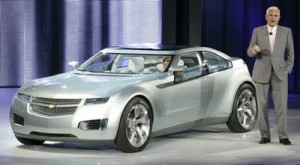By Greg Dalton (8/20/09). General Motors has been in the headlines just about every day lately, with mostly positive news for a change. Last week, to mark 30 days since it emerged from bankruptcy as the “New GM,” Vice Chairman Bob Lutz took the stage at the company’s design center near Detroit to talk up the prospects for the slimmed down automaker. The image was much like the one above, with Lutz standing in front of a Chevy Volt.
Lutz told the audience of auto enthusiasts he welcomed the auto industry oversight panel, saying “finally we have someone to talk to” who understands the industry, adding he hoped it continues after GM pays back the $50 billion taxpayer bailout.
When it came to questions, I raised my hand and asked him if he still believes global warming is a croc. He said, “I hoped that question wouldn’t come up,” and then launched into a 3 minute explanation of why he doesn’t believe the global consensus of scientists embodied in the Intergovernmental Panel on Climate Change. But, he said, those views were his personal opinion and don’t reflect company policy or the products it decides to build.
Lutz, who is credited with igniting the SUV craze by championing the original Ford Explorer while he worked at that crosstown rival, is a legend in the car business and has tremendous sway in side the company. When he finished answering questions a GM press person came scrambling over to say his views are the subject of debate within the company and there are internal controls to make sure he doesn’t steer the company astray.
That may be but it is still strange to have a global warming denier as the front man for an automaker rising from the ashes and trying to remake itself as a company relevant in the era of climate change. A former Marine, Lutz speaks his mind and no one in the company seems able or willing to try to reign him in.
Next the group was taken to tour the Volt practice assembly line, where auto workers are learning how to assemble the Volt, which is due to go on sale in the fall of 2010.
 It was convincing evidence that, contrary to what some skeptics say, GM really will build these electric cars even though it will lose money on each unit initially, as Toyota did with its groundbreaking Prius. The Volt will sell for around $40,000 less a $7,500 federal tax credit.
It was convincing evidence that, contrary to what some skeptics say, GM really will build these electric cars even though it will lose money on each unit initially, as Toyota did with its groundbreaking Prius. The Volt will sell for around $40,000 less a $7,500 federal tax credit.
Some eighty percent of Americans drive less than 40 miles a day and for those people Lutz says “The biggest problem you’ll have is figuring out what to do with the extra gas in your tank.” That serial hybrid technology definitely is a leapfrog over the Prius, which is constantly switching back and forth between battery and gasoline power. Stil, GM and all US automakers are clearly playing catchup to Japanese car companies when it comes to hybrids and battery technology.
On a trip to the GM Heritage Center I viewed evidence that it didn’t have to be this way. Inside the building the size of a basketball arena there are dozens of sleek and shiny cars from GM’s heyday as the pinnacle of mass manufacturing. Over in one corner is an Electrovair II from 1966. That’s right, an electric car with a lead acid battery. And next to it is an Electrovan fuel cell vehicle from 1966. Those propulsion systems are still “experimental” at GM today.
If GM, and other automakers, had kept working on those technologies the past forty years they almost certainly wouldn’t be in the predicament they are in today. Former CEO Rick Wagoner, who visited Climate One in May 2008, later said killing the Electric Car was the worst decision he ever made.
So far, it looks like GM has learned its lesson and is going full tilt on the Volt. The proof will be how much marketing money it puts behind the car and whether it ramps up production from the 10,000 units (some insiders say 25,000) it plans to build the first year. That’s a rounding error in the 8 million cars GM sold worldwide in 2008.
But its a start and, as GM executives are quick to say, it is up to consumers to buy them.
